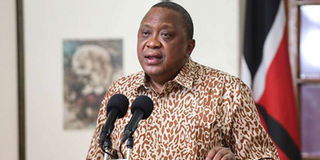Uhuru at UN: President calls for financial aid, debt delays for Africa

President Uhuru Kenyatta.
What you need to know:
- The President did not refer to his own government, which owes about Sh3.4 trillion to external lenders, nearly a quarter of which is demanded by China for its infrastructure loans, but the President has rallied with leaders from other African countries before, including those from Ethiopia, Mali, South Africa, Rwanda and Egypt, in calling for debt relief.
President Uhuru Kenyatta on Wednesday called for urgent decisions on debt relief and financial aid to Africa's poor to help the continent's quick recovery from the Covid-19 shocks.
In a speech to the 75th UN General Assembly (UNGA), President Kenyatta said the world must unite to help those the infectious virus has most affected.
And it came down to debt relief, a subject he has dwelt on since April this year in meetings with his peers in the African Union Bureau.
"What is equally important is that even after addressing the acute phase of the pandemic, we must all remain collectively committed to global recovery," he said in a speech given virtually from Mombasa.
"Developing countries seeking to have the existing debt moratorium refined and extended to December 2021, and an early replenishment of the IMF Poverty Reduction and Growth Trust (PRGT) and the World Bank International Development Association (IDA), as well as an early decision on the Special Drawing Rights."
The President did not refer to his own government, which owes about Sh3.4 trillion to external lenders, nearly a quarter of which is demanded by China for its infrastructure loans, but the President has rallied with leaders from other African countries before, including those from Ethiopia, Mali, South Africa, Rwanda and Egypt, in calling for debt relief.
As early as April, the African Union Bureau, a grouping of leaders from the AU member states to which President Kenyatta belongs, had called for "efforts to mitigate against the adverse effects of the global coronavirus pandemic" including pushing for loan waivers.
On Wednesday, the President referred to the IMF's Poverty Reduction and Growth Trust, a subsidised loan facility that targets low income countries. Beneficiary countries for this facility often get the loans interest-free. And based on the levels of need by each of the developing countries, African countries have been asking for a raise on the limit so they can access more funds.
African countries have also asked for quicker decisions on how they can access their various quotas of foreign reserves due to them at the IMF. Known as the Special Drawing Rights, the IMF allocates them to countries in times of financial or other crises to boost liquidity and steady local currencies. But applicants must meet certain conditions, especially on governance and financial transparency, which may take longer to qualify.
The President's speech mostly focused on global revival efforts amid the pandemic. He called for lifting of sanctions against Zimbabwe, Cuba and Sudan, which he argued cannot recover their economies unless they are freed to access lending and trade. In Africa, the novel coronavirus has infected some 1.4 million people, killing 34,077 of them by Tuesday night, according to the Africa CDC.
Yet the President said the UN's strength to help members recover from the pandemic will depend on how member support its systems.
"The Covid-19 pandemic and other contemporary challenges including the climate and biodiversity crisis that we face … and governance as well as the vulnerabilities of our digital world, have, indeed, redefined the imperative for multilateral action," he said.
"Kenya believes strongly that if we remain anchored in multilateralism and with unity of purpose, if we are much more agile in embracing change and positive transformations … we can transcend our challenges and secure lasting peace and prosperity for all.
The UN, formed 75 years ago, was supposed to prevent any future global wars. And while it prevented a WWIII, proxy conflicts erupted across the world. Today, the UN has reported about 25 million refugees, more than the number created by the WWII.
The President told the audience on Wednesday the UN's inability to prevent crises results from partisan political interest of its influential members.
"Global geopolitics and competition between global powers have complicated and severely undermined the global response to the Covid-19 pandemic.
"Indeed, they have caused severe anxiety and undermined coordinated responses to an economic and social character that would have left us in a stronger position as a global collective."
The President did not name those powers, but at the start of the pandemic, China and the US bickered on the origin of the virus and the turf wars eventually reached the World Health Organisation. The US, the world's biggest donor to the WHO with about $400 million a year, has since indicated it will withdraw from the global health organisation in the next 10 months.
In his speech, UN Secretary-General Antonio Guterres said the world was reliving the problems that forced the creation of the UN in 1945.
"Those who built the UN 75 years ago had lived through a pandemic, a global depression, genocide and world war. They knew the cost of discord and the value of unity," he said on Tuesday.
"The Covid-19 pandemic is a crisis unlike any we have ever seen. Today, we face our own 1945 moment."
African countries, in the meantime, have demanded reforms at the UN to expand the UN Security Council and include other countries from Africa. Since its formation in 1945, the UN has retained the founding permanent members of the UN Security Council: Russia, US, China, France and UK. They have veto powers on decisions that affect global peace and security.
This year, the UN is celebrating "The Future that We Want; the United Nations that We Need: Reaffirming our Collective Commitment to Multilateralism." It is a call to rally members to defend the organisation.





